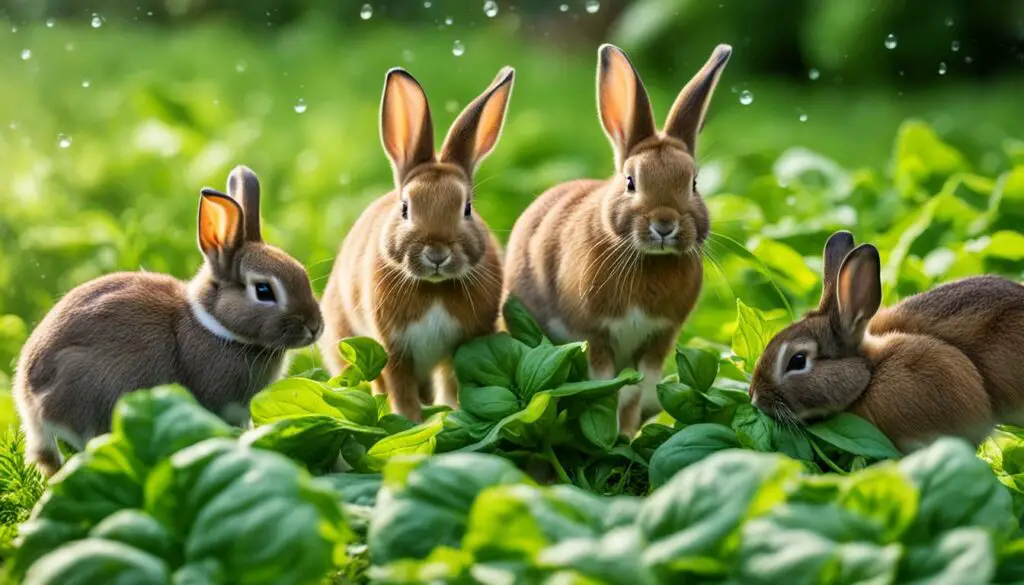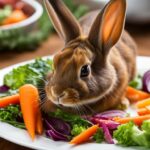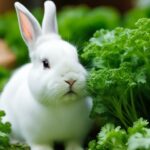As a bunny owner, you want to provide the best care and nutrition for your furry friend. One question that may have crossed your mind is whether rabbits can eat basil. In this article, I’ll uncover the truth about feeding basil to rabbits and explore the benefits it offers to their diet.
Rabbits are herbivores with sensitive digestive systems, so it’s essential to know what foods are safe for them. Basil is one herb that can be enjoyed by rabbits, along with other rabbit-friendly herbs like rosemary, oregano, mint, cilantro, and sage.
But is basil safe for rabbits? The answer is yes! Basil is considered to be a safe herb for rabbits to consume. It does not contain any toxins and can be a nutritious addition to their diet.
However, while basil is safe for rabbits, it should not be the main component of their diet. It should be given to them in moderation, alongside a variety of other vegetables and greens. Prioritizing hay or grass as the main source of food is crucial for a rabbit’s health.
So, why should you consider adding basil to your rabbit’s diet? Basil contains carbohydrates, proteins, vitamins (A, B1, B2, B3, B5, C, K), minerals (calcium, iron, magnesium, zinc, sodium), and fiber. While it doesn’t have as much fiber as hay, it still provides essential nutrients that contribute to your rabbit’s overall health and well-being.
Basil also offers additional benefits to rabbits. It is rich in flavonoids, which have antioxidant, anti-inflammatory, and antibacterial properties. These properties help protect your rabbit’s cells from damage, keep them safe from illnesses, and reduce the risk of food poisoning. If your rabbit has arthritis, the anti-inflammatory properties of basil can provide some relief.
When introducing basil to your rabbit’s diet, you may notice a distinct aroma. While some rabbits may be affected by the scent while chewing basil leaves, it is generally safe and not harmful to them. If you’re concerned about the strong aroma or flavor, you can try milder variants of basil like Thai basil or sweet basil.
Growing basil in your backyard can be a great way to provide fresh and safe basil for your rabbits. Just make sure to plant it in pots or directly in the soil, keeping it out of reach from curious bunnies.
In conclusion, rabbits can eat basil, and it can be a nutritious addition to their diet. Just remember to offer it in moderation and prioritize hay or grass as their main source of food. Monitor your rabbit’s health and introduce new foods gradually to ensure they are happy and healthy.
Key Takeaways:
- Feeding basil to rabbits is safe and can be a nutritious addition to their diet.
- Basil contains essential nutrients like carbohydrates, proteins, vitamins, minerals, and fiber.
- Basil offers additional health benefits, such as antioxidant and anti-inflammatory properties.
- Monitor your rabbit’s health and introduce new foods gradually to ensure they tolerate them well.
- Remember to prioritize hay or grass as the main component of a rabbit’s diet.
The Safety of Basil for Rabbits
When it comes to the safety of feeding basil to rabbits, you can rest assured knowing that it is considered to be a safe herb for them. Basil, along with other herbs like rosemary, oregano, mint, cilantro, and sage, does not contain any toxins that could harm rabbits. In fact, basil can be a nutritious addition to a rabbit’s diet, providing them with a variety of essential nutrients.
Basil is rich in carbohydrates, proteins, vitamins (such as A, B1, B2, B3, B5, C, K), minerals (including calcium, iron, magnesium, zinc, and sodium), and fiber. While it may not have as much fiber as hay, basil still contributes to a rabbit’s overall health and well-being. These nutrients play a crucial role in supporting their immune system, promoting healthy digestion, and maintaining strong bones and teeth.
It’s important to note that while basil is safe for rabbits, it should not be the main component of their diet. Like other vegetables, basil should be given in moderation and as part of a varied diet. Hay or grass should always be the primary source of food for rabbits, with basil and other greens being supplementary. Remember to introduce small amounts of basil gradually and monitor your rabbit’s reaction to ensure their health and well-being.
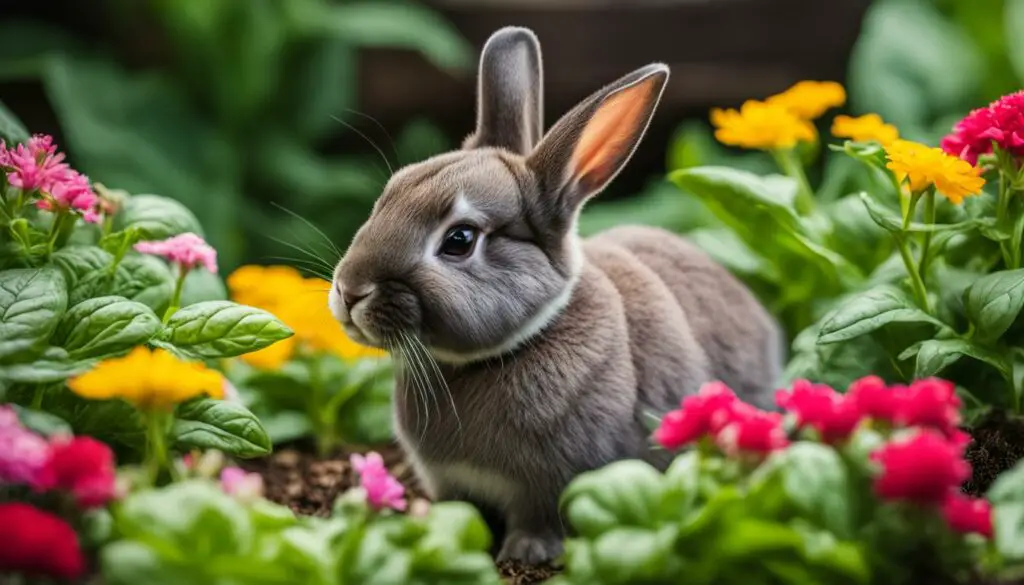
Proper Portion Sizes for Basil
While basil is safe for rabbits to eat, it should be given in moderation as part of a varied diet. Just like other vegetables, basil should not be the main component of a rabbit’s diet. It’s important to prioritize hay or grass as the main source of food for rabbits, as they provide essential nutrients and fiber.
To introduce basil to your rabbit’s diet, start by offering small amounts and observe their reaction. If there are no adverse reactions, you can gradually increase the portion size. However, it’s crucial to monitor your rabbit’s health and overall well-being to ensure that they are not experiencing any digestive issues.
Remember that each rabbit is unique, and their dietary needs may vary. It’s always best to consult with a veterinarian who specializes in rabbit care for personalized recommendations based on your rabbit’s age, weight, and overall health condition.
Table: Recommended Portion Sizes for Basil
| Rabbit Weight | Portion Size |
|---|---|
| 1-2 pounds | 1-2 small leaves |
| 2-4 pounds | 2-3 small leaves |
| 4-6 pounds | 3-4 small leaves |
| 6+ pounds | 4-5 small leaves |
By following the recommended portion sizes, you can ensure that your rabbit receives the nutritional benefits of basil without overfeeding them. Remember that variety is essential in a rabbit’s diet, so be sure to incorporate other safe and nutritious vegetables and herbs alongside basil.
The Nutritional Benefits of Basil
Basil is not only a flavorful herb but also offers several nutritional benefits for rabbits. It contains essential vitamins, minerals, and fiber that contribute to their overall health and well-being.
Here are some of the key nutrients found in basil:
- Vitamins: Basil is a rich source of vitamins A, B1, B2, B3, B5, C, and K. These vitamins play a vital role in maintaining a rabbit’s immune system, promoting healthy vision, supporting brain function, and aiding in blood clotting.
- Minerals: Basil contains important minerals like calcium, iron, magnesium, zinc, and sodium. These minerals are essential for bone development, oxygen transportation, enzyme function, and electrolyte balance.
- Fiber: While basil does not have as much fiber as hay, it still contributes to a rabbit’s fiber intake. Fiber promotes healthy digestion, prevents gastrointestinal issues, and keeps their teeth worn down.
By including basil in your rabbit’s diet, you can provide them with a variety of nutrients that support their overall health and vitality. Remember to introduce basil gradually and monitor your rabbit for any adverse reactions.
| Nutrient | Amount in Basil (Per 100g) |
|---|---|
| Vitamin A | 2648 IU |
| Vitamin B1 (Thiamine) | 0.034 mg |
| Vitamin B2 (Riboflavin) | 0.076 mg |
| Vitamin B3 (Niacin) | 0.902 mg |
| Vitamin B5 (Pantothenic Acid) | 0.209 mg |
| Vitamin C | 18 mg |
| Vitamin K | 414.8 mcg |
| Calcium | 177 mg |
| Iron | 3.17 mg |
| Magnesium | 64 mg |
| Zinc | 0.81 mg |
| Sodium | 4 mg |
| Fiber | 1.6 g |
Additional Benefits of Basil
Aside from its nutritional content, basil offers several additional benefits that can contribute to the overall health and well-being of rabbits. One of the key advantages of feeding basil to rabbits is its rich flavonoid content. Flavonoids are natural compounds that possess antioxidant, anti-inflammatory, and antibacterial properties. These properties help protect the rabbit’s cells from damage, keep them safe from illnesses, and reduce the risk of food poisoning.
Basil’s anti-inflammatory properties can also benefit rabbits with arthritis or other inflammatory conditions. The presence of anti-inflammatory compounds in basil can help alleviate pain and discomfort, promoting better mobility and overall comfort for rabbits suffering from joint issues. By incorporating basil into their diet, rabbit owners can provide their furry friends with a natural, plant-based solution to manage inflammation and improve their quality of life.
It’s important to note that while basil offers these additional benefits, it should still be given in moderation as part of a well-balanced diet. Prioritizing hay or grass as the main source of food is crucial, and basil should be offered as a supplement rather than the primary food source. By maintaining a balanced and varied diet, owners can ensure that their rabbits receive all the necessary nutrients for optimal health, with basil providing an extra boost of flavor and beneficial compounds.
Adding a small amount of basil to your rabbit’s diet can provide a range of benefits, from antioxidant and anti-inflammatory properties to antibacterial effects. However, it’s important to remember that basil should only be a part of a well-rounded diet that includes other fresh greens, hay, and limited amounts of fruits and vegetables. Always monitor your rabbit’s health and consult with a veterinarian if you have any concerns.
| Benefit | Description |
|---|---|
| Antioxidant properties | Basil contains flavonoids that protect rabbit’s cells from damage. |
| Anti-inflammatory effects | The anti-inflammatory compounds in basil can provide relief for rabbits with arthritis or other inflammatory conditions. |
| Antibacterial properties | Basil’s antibacterial properties can help safeguard rabbits from food poisoning. |
In summary, adding basil to a rabbit’s diet can offer additional benefits beyond its nutritional content. The flavonoids in basil provide antioxidant, anti-inflammatory, and antibacterial properties, which can help protect the rabbit’s cells, alleviate pain, and reduce the risk of food poisoning. However, it’s important to remember that basil should be given in moderation as part of a balanced diet, with hay or grass remaining the main source of food. By incorporating basil as a supplement, rabbit owners can enhance their pets’ overall health and well-being.

The Scent of Basil and Its Impact on Rabbits
Basil, with its unique aroma and flavor, can have an interesting impact on rabbits. While some rabbits may be affected by the scent while chewing basil leaves, it is generally safe and not harmful to them. In fact, the scent of basil can be quite enticing to rabbits, enticing them to explore and interact with the herb.

What’s important to note is that the scent of basil should not be overpowering or overwhelming for rabbits. If you are concerned about the strong aroma or flavor, you can try variants like Thai basil or sweet basil, which have milder scents. This way, you can still provide the benefits of basil to your rabbits without causing any discomfort.
It’s worth mentioning that rabbits have a keen sense of smell, and they use it to navigate their environment and identify potential sources of food. So, the scent of basil can actually enhance their sensory experience and provide mental stimulation for them.
Growing Basil for Rabbits
If you want to provide fresh basil to your rabbits, you can easily grow it in your backyard. Growing basil ensures that you have a steady supply of this herb for your furry friends. Not only is it convenient, but it also allows rabbits to enjoy the fresh leaves while exploring their surroundings. There are a few things to keep in mind when growing basil for rabbits.
Firstly, it’s essential to ensure that the basil plants are protected from rabbits themselves. They may be tempted to nibble on the leaves or even dig up the plants. To prevent this, you can plant basil in pots, placing them out of the rabbits’ reach. Alternatively, you can grow basil directly in the soil, but make sure to secure the area with a fence or other protective measures.
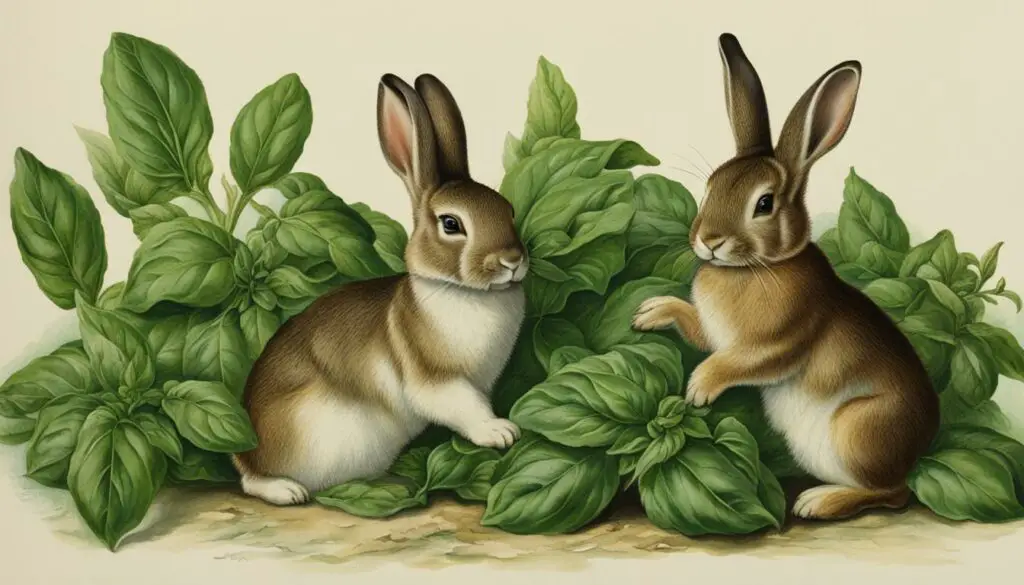
Additional Tips for Growing Basil for Rabbits:
- Choose a sunny spot in your garden or yard for growing basil. Basil thrives in full sun and requires at least six hours of direct sunlight daily.
- Ensure that the soil is well-drained and fertile. You can amend the soil with organic matter, such as compost, to provide the necessary nutrients for healthy basil growth.
- Water the basil plants regularly, keeping the soil moist but not waterlogged. Be cautious not to overwater, as this can lead to root rot.
- Harvest the basil leaves regularly to encourage new growth. This will provide a constant supply of fresh basil for your rabbits to enjoy.
By following these tips, you can successfully grow basil for your rabbits and provide them with a fresh and nutritious treat. Remember to introduce new foods gradually and monitor your rabbits for any adverse reactions. With a bit of care and attention, you can cultivate a thriving basil garden to enhance your rabbits’ diet and well-being.
Introduction to Rabbit Diet
When it comes to a rabbit’s diet, it’s important to ensure that it is well-balanced and consists of a variety of foods to meet their nutritional needs. The main component of a rabbit’s diet should be grass hay, which provides essential nutrients such as Vitamin A, D, calcium, protein, and fiber. This helps promote healthy teeth and proper gastrointestinal tract function.
In addition to hay, fresh greens should make up approximately 75% of a rabbit’s diet. Leafy greens like parsley, spinach, mustard greens, beet greens, and yes, even basil, are safe and nutritious options for rabbits. These greens provide additional vitamins, minerals, and moisture in their diet.
While fresh greens are important, it’s also essential to include a small amount of fruits and vegetables in a rabbit’s diet. Non-leafy vegetables and fruits should be limited to about 15% and 10% respectively. Safe options include carrots, broccoli, cucumber, bell peppers, and various fruits.
Focusing on Hay
“Hay is crucial for a rabbit’s diet as it promotes healthy teeth and gastrointestinal tract function.
Grass hay should be available to rabbits at all times. It acts as a natural toothbrush, helping to wear down their teeth, which continuously grow. Additionally, hay provides essential fiber, which aids in digestion and prevents common issues like gastrointestinal stasis. Rabbits need a constant supply of hay to maintain optimal health.
A Balanced Diet for Happy Bunnies
“A balanced diet for rabbits includes a mix of hay, fresh greens, and a small amount of fruits and vegetables.”
Providing a well-balanced diet is key to ensuring your bunny stays healthy and happy. Offering a variety of foods, including grass hay, fresh greens, and limited amounts of fruits and vegetables, will help meet their specific nutritional needs. Remember to monitor your rabbit’s health and make any necessary adjustments to their diet based on their individual requirements.
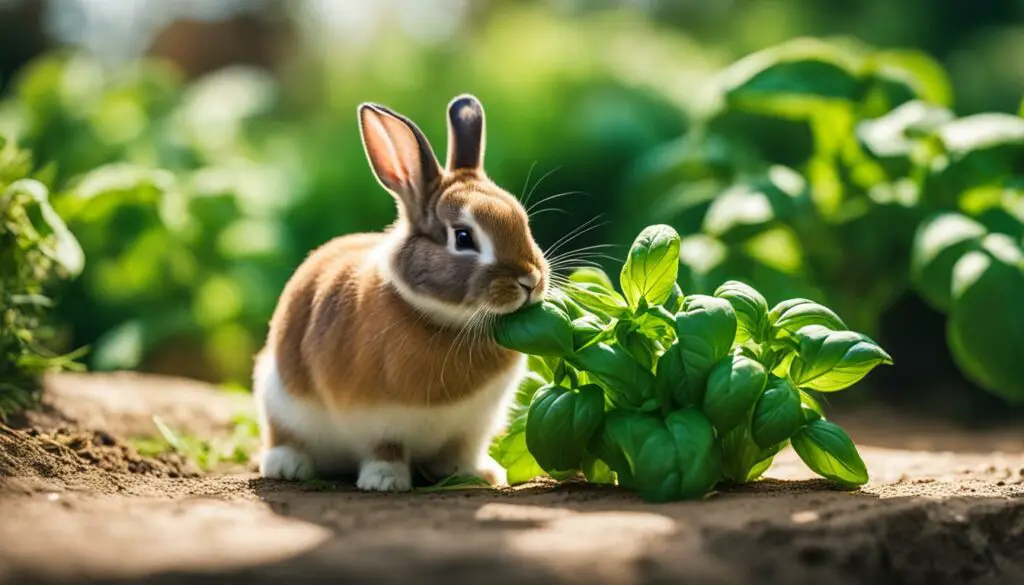
Importance of Hay in a Rabbit’s Diet
When it comes to a rabbit’s diet, hay plays a vital role in promoting their overall health and well-being. It is a crucial source of essential nutrients and fiber that is necessary for proper digestion and dental health. Hay helps to keep a rabbit’s teeth naturally worn down as they chew, preventing dental issues that can arise from overgrown teeth.
Grass hay, such as timothy hay or orchard grass, is the best type of hay to offer to rabbits. It provides important nutrients like Vitamin A, Vitamin D, calcium, and protein. The high fiber content in hay promotes healthy gastrointestinal tract function, preventing issues like gastrointestinal stasis (GI stasis) and other digestive problems that can be life-threatening to rabbits.
Rabbits should have access to hay at all times, and it should make up the majority of their diet. A general guideline is to offer them unlimited amounts of fresh hay, replenishing it daily to ensure its quality. By providing rabbits with a constant supply of hay, you are allowing them to engage in natural foraging behaviors, keeping them mentally stimulated and physically active.
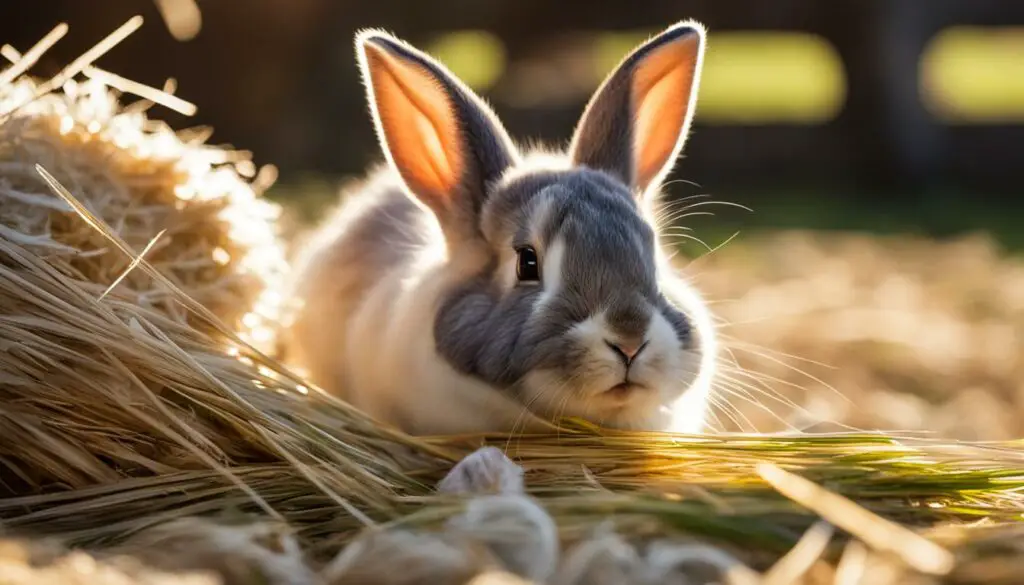
The Benefits of Hay in a Rabbit’s Diet
The inclusion of hay in a rabbit’s diet offers several benefits:
- Healthy Teeth: Chewing on hay helps to wear down a rabbit’s continuously growing teeth, preventing dental issues.
- Proper Digestion: The high fiber content in hay aids in maintaining a healthy gastrointestinal tract, preventing digestive problems.
- Prevention of Obesity: Hay is a low-calorie food that provides bulk to a rabbit’s diet, helping to prevent obesity.
| Hay Type | Nutritional Content | Recommended for |
|---|---|---|
| Timothy Hay | High in fiber, low in calcium and protein | Adult rabbits, rabbits prone to urinary tract issues |
| Orchard Grass | Moderate fiber, low in calcium and protein | Rabbits with sensitive digestive systems, rabbits prone to obesity |
| Brome Hay | High in fiber, low in calcium and protein | Adult rabbits, rabbits needing weight management |
It’s important to note that hay should be fresh, dry, and free from dust or mold. Avoid offering hay that has a strong musty odor or discoloration. By including hay as a staple in a rabbit’s diet, you are providing them with the necessary nutrients and promoting their overall well-being.
Fresh Greens for Rabbit Nutrition
When it comes to providing a healthy and balanced diet for rabbits, fresh greens play a crucial role. These leafy greens are not only safe for rabbits, but they also offer a variety of essential nutrients that contribute to their overall health and well-being. Including a variety of fresh greens in a rabbit’s diet ensures that they receive the necessary vitamins, minerals, and moisture to thrive.
Some of the best greens to feed rabbits include parsley, spinach, mustard greens, beet greens, and of course, basil. These greens are not only rich in vitamins such as A, B, and C but also provide minerals like calcium and iron. Including a mixture of these fresh greens in your rabbit’s diet can help support their immune system, promote healthy bones, and contribute to their overall vitality.
It’s important to introduce fresh greens gradually into your rabbit’s diet to prevent digestive upset. Start by offering small amounts and observe how your rabbit reacts. If they tolerate the greens well, you can gradually increase the portion size. Remember to always provide a variety of greens to ensure a well-rounded diet for your furry friend.
| Types of Fresh Greens | Nutritional Benefits |
|---|---|
| Parsley | High in vitamin C and iron |
| Spinach | Rich in vitamins A, C, and K |
| Mustard Greens | Provides vitamins A, C, and E |
| Beet Greens | High in iron and fiber |
| Basil | Contains vitamins A, B, C, and K |
Remember to wash all fresh greens thoroughly before serving them to your rabbit to remove any potential pesticides or contaminants. Also, ensure that the greens are fresh and crisp to maximize their nutritional value. By incorporating a variety of fresh greens into your rabbit’s diet, you can provide them with a nutritious and delicious meal that supports their overall health.
Variety of Fruits and Vegetables for Rabbits
When it comes to the diet of your furry friend, offering a variety of fruits and vegetables can help ensure a well-rounded and nutritious meal plan. While leafy greens should make up the majority of a rabbit’s fresh food intake, incorporating non-leafy vegetables and fruits can provide additional flavors, textures, and essential nutrients. Here are some safe options to consider:
Non-Leafy Vegetables:
- Carrots: Carrots are a popular vegetable among rabbits and can be given in small amounts. They are a great source of Vitamin A and provide a satisfying crunch.
- Broccoli: Broccoli can be offered sparingly, as it is rich in fiber and contains important vitamins and minerals. However, it should be introduced gradually to avoid any gastrointestinal issues.
- Cucumber: Cucumber is a hydrating vegetable that rabbits can enjoy. It contains high water content and can help keep your rabbit hydrated, especially during hot weather.
- Bell Peppers: Bell peppers, whether red, green, or yellow, are safe for rabbits to eat. They provide a delicious crunch and are a good source of Vitamin C.
Fruits:
- Apples: Apples are a sweet treat that rabbits can enjoy in moderation. Remember to remove the seeds and core, as they can be harmful to your furry friend.
- Bananas: Bananas are a tasty and nutritious fruit that rabbits love. However, due to their high sugar content, they should be given sparingly as an occasional treat.
- Blueberries: Blueberries are packed with antioxidants and can be a delicious addition to your rabbit’s diet. Offer them in small amounts as a special treat.
- Strawberries: Strawberries are another fruit that rabbits can enjoy in moderation. They provide Vitamin C and a burst of flavor.
Remember, while fruits and vegetables are a valuable addition to a rabbit’s diet, they should be offered in moderation. Too much of these foods can cause digestive issues, so it’s important to prioritize a balanced diet with emphasis on hay or grass. Always monitor your rabbit’s health and consult with a veterinarian if you have any concerns about their diet or nutrition.
| Fruit/Vegetable | Benefits |
|---|---|
| Carrots | Rich in Vitamin A and provide a satisfying crunch. |
| Broccoli | High in fiber and contains important vitamins and minerals. |
| Cucumber | Hydrating and provides a refreshing crunch. |
| Bell Peppers | Rich in Vitamin C and adds a variety of colors to the diet. |
| Apples | A sweet treat that is a good source of fiber. |
| Bananas | A delicious treat that provides natural sugars and nutrients. |
| Blueberries | Packed with antioxidants and adds a burst of flavor to the diet. |
| Strawberries | Rich in Vitamin C and adds a touch of sweetness. |
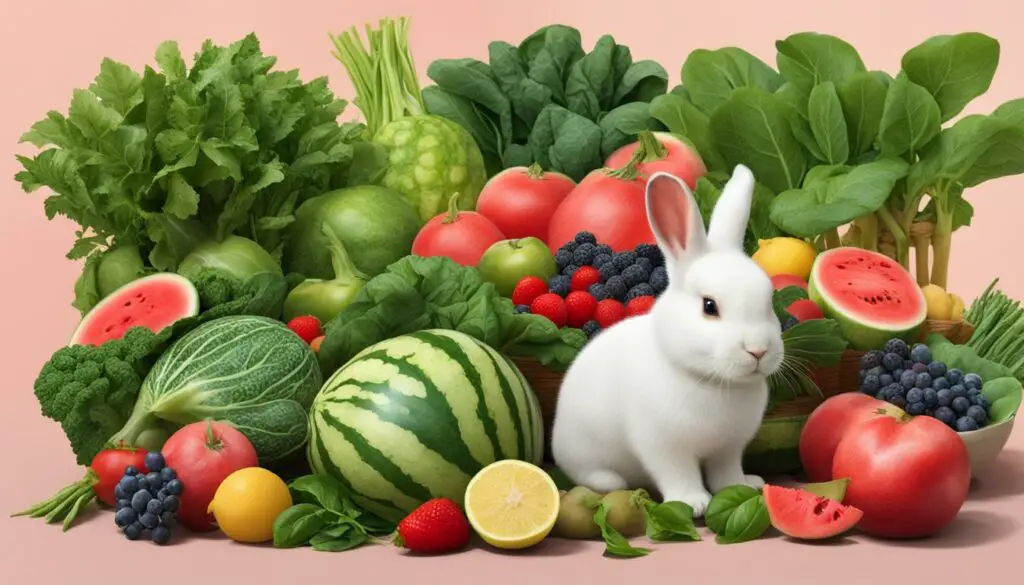
The Importance of a Balanced Bunny Diet
When it comes to feeding rabbits, it’s essential to provide a well-balanced diet that includes a variety of foods. While basil can be a safe and nutritious addition to their meals, it should be given in moderation, alongside other vegetables and fruits.
Properly Introducing Basil to Your Bunny’s Diet
Before incorporating basil into your bunny’s meals, it’s important to start with small amounts and observe their reaction. If there are no adverse effects like diarrhea or gastrointestinal issues, you can gradually increase the portion size. Remember to prioritize hay or grass as the main component of their diet, with basil being a supplemental treat.
The Benefits of Feeding Basil to Rabbits
Basil provides rabbits with essential nutrients such as carbohydrates, proteins, vitamins (A, B1, B2, B3, B5, C, K), minerals (calcium, iron, magnesium, zinc, sodium), and fiber. While it may not have as much fiber as hay, it still contributes to their overall health and well-being. Additionally, basil is rich in flavonoids, which have antioxidant, anti-inflammatory, and antibacterial properties that can help protect rabbits from illnesses and cell damage.
| Nutrient | Amount |
|---|---|
| Carbohydrates | 1.6g |
| Proteins | 3.1g |
| Vitamin A | 264 IU |
| Vitamin C | 6.8mg |
| Calcium | 177mg |
By providing basil to your rabbits in moderation, you can offer them a variety of flavors and nutrients to support their overall health. Just remember to prioritize a balanced diet that includes hay or grass as the main component, and consult with your veterinarian for personalized dietary recommendations for your furry friend.
Potential Harmful Effects of Basil on Rabbits
While basil is generally safe for rabbits to consume, it’s important to be mindful of the potential harmful effects that can arise from excessive consumption. Feeding large amounts of basil to rabbits can lead to health issues such as diarrhea or gastrointestinal stasis (GI stasis). These conditions can occur due to the low fiber content in basil, which can disrupt the rabbit’s digestive system.
To ensure the well-being of your rabbit, it’s crucial to include basil in moderation as part of a balanced diet. Monitor your rabbit’s health closely after introducing basil and observe for any adverse reactions. If your rabbit experiences any digestive issues or changes in behavior, it’s best to consult a veterinarian.
“Feeding excessive amounts of basil to rabbits can lead to health issues such as diarrhea or gastrointestinal stasis (GI stasis).”
Remember, hay or grass should always be the main component of a rabbit’s diet, providing essential fiber for proper digestion. Basil can be offered as a treat or a supplement to add variety and nutrients to their diet. It’s important to prioritize the overall nutritional balance and not rely solely on basil as a primary food source for your rabbit.
By offering a diverse range of vegetables, leafy greens, and occasional fruits in moderation, you can provide your rabbit with a well-rounded diet that promotes their overall health and well-being.
| Potential Harmful Effects of Excessive Basil Consumption on Rabbits | Precautions |
|---|---|
| Diarrhea | Monitor rabbit’s health closely after introducing basil and observe for any adverse reactions. Consult a veterinarian if necessary. |
| Gastrointestinal stasis (GI stasis) | Include basil in moderation as part of a balanced diet. Ensure the rabbit has access to hay or grass, which forms the main component of their diet. |
The Safety of Basil for Rabbits
When it comes to the question of whether rabbits can eat basil, the answer is a resounding yes! Basil is considered to be a safe herb for rabbits to consume, along with other herbs like rosemary, oregano, mint, cilantro, and sage. This means that you can confidently introduce basil into your rabbit’s diet as part of a healthy and varied meal plan.
Basil does not contain any toxins that could harm your rabbit, making it a safe addition to their diet. Not only is basil safe for rabbits, but it also offers numerous benefits to their health. From providing essential nutrients to supporting overall well-being, basil can contribute to your rabbit’s overall health and happiness.
However, it’s important to remember that basil should not be the main component of your rabbit’s diet. Like other vegetables, basil should be given to rabbits in moderation. The majority of a rabbit’s diet should consist of grass hay, which provides essential nutrients such as Vitamin A, D, calcium, protein, and fiber. Fresh greens and a small amount of fruit can also be included to provide variety and additional nutrients.
Table: Nutritional Content of Basil for Rabbits
| Nutrient | Amount per 100g |
|---|---|
| Carbohydrates | 2.65g |
| Proteins | 3.15g |
| Vitamin A | 2640 IU |
| Vitamin C | 18mg |
| Calcium | 177mg |
| Fiber | 1.6g |
As you can see from the table above, basil contains carbohydrates, proteins, vitamins (A, C), calcium, and fiber. While basil may not have as much fiber as hay, it still provides important nutrients that can contribute to your rabbit’s overall health. So go ahead and offer your furry friend a tasty treat of basil leaves every now and then, knowing that you’re providing them with nutritional benefits.
Remember to introduce new foods gradually and monitor your rabbit’s reaction. If you notice any adverse reactions or digestive issues, it’s best to consult with a veterinarian. By offering a balanced and varied diet that includes basil and other rabbit-friendly foods, you can ensure that your bunny stays happy and healthy.
Conclusion
Can rabbits eat basil? The answer is yes! Basil is a safe and nutritious addition to a rabbit’s diet when given in moderation. It provides essential vitamins, minerals, and antioxidants that contribute to their overall health.
However, it’s important to remember that basil should not be the main component of a rabbit’s diet. Hay or grass should always be the priority, as they provide the necessary nutrients, fiber, and dental health benefits. Basil, along with other fresh greens and a small amount of fruits and vegetables, can be included to add variety and additional nutrients to their meals.
When introducing basil to your rabbit, start with small amounts and observe their reaction. Gradually increase the portion size if there are no adverse effects. Be cautious not to overfeed basil, as excessive consumption can lead to health issues such as diarrhea or gastrointestinal stasis. Always monitor your rabbit’s health and consult a veterinarian if you have any concerns.
In summary, while rabbits can enjoy basil as part of a balanced diet, it’s crucial to offer a diverse range of foods and prioritize hay or grass. By providing the right nutrition and monitoring their well-being, you can ensure that your furry friend stays happy and healthy!
FAQ
Can rabbits safely eat basil?
Yes, basil is safe for rabbits to consume. It is considered to be a safe herb along with other herbs like rosemary, oregano, mint, cilantro, and sage.
Is basil a nutritious addition to a rabbit’s diet?
Basil contains carbohydrates, proteins, vitamins (A, B1, B2, B3, B5, C, K), minerals (calcium, iron, magnesium, zinc, sodium), and fiber. It provides important nutrients that contribute to the overall health and well-being of rabbits.
How much basil should I feed my rabbit?
Basil, like other vegetables, should be given to rabbits in moderation, as part of a varied diet. Start by introducing small amounts of basil and observe your rabbit’s reaction. If there are no adverse reactions, gradually increase the portion size.
What are the benefits of feeding basil to rabbits?
Basil is rich in flavonoids, which have antioxidant, anti-inflammatory, and antibacterial properties. These properties help protect the rabbit’s cells from damage, keep them safe from illnesses, and reduce the risk of food poisoning. Basil’s anti-inflammatory properties can also benefit rabbits with arthritis.
Does the scent of basil affect rabbits?
While some rabbits may be affected by the scent while chewing basil leaves, it is generally safe and not harmful to them. If you are concerned about the strong aroma or flavor, you can try variants like Thai basil or sweet basil which have milder scents.
Can I grow basil for my rabbits?
Yes, you can grow basil in your backyard for your rabbits to enjoy. Ensure that the basil is planted in pots to prevent rabbits from damaging or breaking the plants. Alternatively, you can grow basil directly in the soil, allowing rabbits to enjoy the fresh leaves safely while exploring their surroundings.
What should be the main component of a rabbit’s diet?
The main component of a rabbit’s diet should be grass hay, which provides essential nutrients like Vitamin A, D, calcium, protein, and fiber.
Why is hay important for rabbits?
Grass hay is crucial for a rabbit’s diet as it promotes healthy teeth and gastrointestinal tract function. It is rich in nutrients like Vitamin A, D, calcium, and protein. Rabbits should have access to hay at all times to ensure proper digestion and prevent dental issues.
Can rabbits eat fruits and vegetables?
Yes, fresh greens and a small amount of fruit can be included in a rabbit’s diet. Leafy greens should comprise the majority of the fresh portion of their diet, while non-leafy vegetables and fruits should be limited to about 15% and 10% respectively.
Are there any harmful effects of basil on rabbits?
Feeding excessive amounts of basil to rabbits can lead to health issues such as diarrhea or gastrointestinal stasis (GI stasis). These conditions can be caused by the low fiber content in basil. It’s important to include basil in moderation and monitor your rabbit’s health for any adverse reactions.
What other foods can be included in a rabbit’s diet?
Carrots, Brussels sprouts, and cucumber are other options to add to your rabbit’s diet, but always in moderation. Remember to prioritize hay as the main component of their diet.

